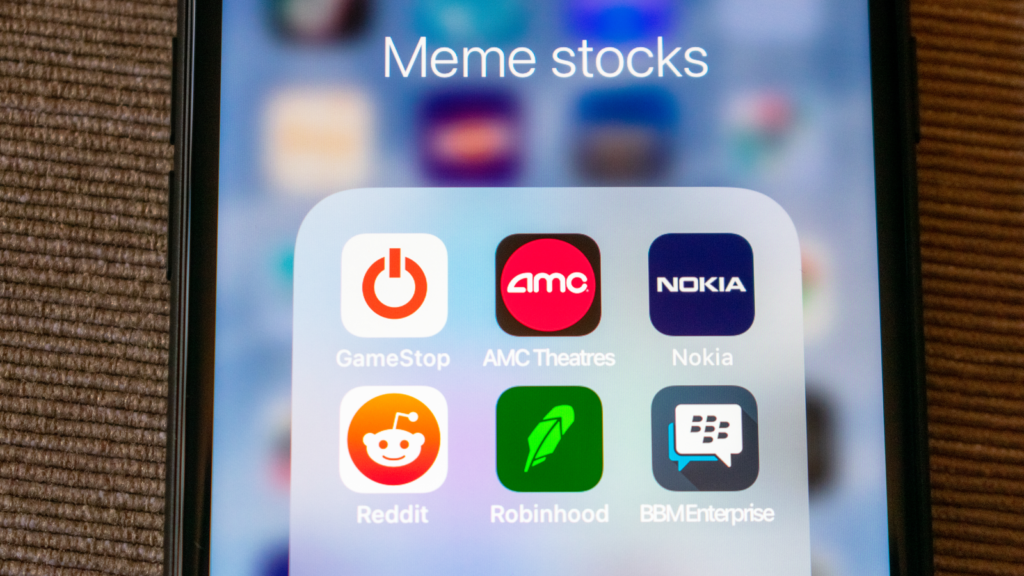If you’re reading this, chances are, you’re not part of the 1% that handsomely benefitted from the prior housing and equities boom that capitalism created. Therefore, it’s difficult not to sympathize with the phenomenon known as meme stocks.
There is a word in German that’s a favorite of mine to deploy from time to time: schadenfreude, or the pleasure a person derives from another’s misfortune. In plain reading, that’s a terrible concept. But let’s be brutally honest: there was plenty of schadenfreude going around when hedge funds suddenly lost out shorting a category of investments which we would later call meme stocks.
Originally, the movement started off through clever engineering of a short squeeze or taking the opposite side of a heavily-shorted position in order to make bears scramble for cover. After all, your losses on a long trade are limited to your principal. In contrast, a pure short position exposes you to unlimited liability since there’s no theoretical limit to upside gains; hence, meme stocks sent a powerful message to Wall Street.
Later on, the narrative expanded to include multiple investment categories with supposedly strong upside potential. And with the deliberate profiteering off private prisons, segments of those who trade meme stocks tossed the ethos altogether. It turned into an Animal Farm situation, where the victims became the abusers. Throughout 2021, several (though not all) meme stocks delivered ridiculous gains, encouraging more participation.
But 2022 is a new year — apparently, one where the music stops. From a Jan. 24 article from Investor’s Business Daily, the value of the meme stock investment category dropped $191 billion from its peak on Feb. 9 of last year. While not a guarantee of future failures, it may be time to avoid these meme stocks for the time being.
- GameStop (NYSE:GME)
- AMC Entertainment (NYSE:AMC)
- Virgin Galactic (NYSE:SPCE)
- Rivian Automotive (NASDAQ:RIVN)
- Palantir Technologies (NYSE:PLTR)
- Roku (NASDAQ:ROKU)
- Beyond Meat (NASDAQ:BYND)
This is the internet, and therefore, you are free to believe whatever you want. However, I’d ask you to avoid dismissing this piece as a “hater’s” article on meme stocks. Rather, you want to be careful about any kind of possible market fad. Once the Wall Street big wigs know your game plan, you don’t want to keep repeating the same tactic.
Meme Stocks to Avoid: GameStop (GME)

As the one that started it all, GameStop used to be a strip-mall favorite among gamers looking for great deals on used titles. However, as console makers decided to launch their subscription-based services, suddenly, the consumer base no longer had to leave their home. They could just download the games they want — leading to a radical paradigm shift in this retail space.
Naturally, GME stock slipped badly. And while I’m cautious about acquiring shares at elevated premiums, I also did mention in June 2020 that GameStop represented great value, and I was thinking about buying shares. This is one of those times where I put my money where my mouth was. And thankfully, it worked out.
However, what do I think about buying GME stock now at just above $100? It’s probably not the wisest idea. Though it kicked off the phenomenon of meme stocks, it’s now one of the leaders in the category’s downfall. On a year-to-date (YTD) basis, GME stock has hemorrhaged about 32% — an obviously terrible look.
Beyond that, though, the security got ahead of itself, especially one tied to a retail segment with severe competition. Thus, I’d wait for the panic to subside before thinking about GameStop or any of the other meme stocks.
AMC Entertainment (AMC)

Another one of the meme stocks that I own, AMC Entertainment personally has a more ignominious narrative. Prior to the novel coronavirus pandemic, I acquired some shares thinking that the box office experience benefitted the cinematic shift toward summer blockbusters.
For instance, if you look at the most popular movies of 2019, you’ll notice that comic-book-derived fare dominated the proceedings. However, the same statistical category for 2000 yielded much more diverse fare, with comedies and even a biographical film making it into the top 10.
The thing is, streaming content services could easily replicate the dramas. But your living room TV could never duplicate the grand experience of watching something like Star Wars on the big screen. Unfortunately, that narrative didn’t pan out for AMC stock and I was left with much red ink.
Then the pandemic happened, along with the movement of meme stocks — subsequentially bailing me out. Still, I left some shares in my portfolio, just in case this phenomenon had legs. Sadly, though, it appears the rally is dying.
Overall, I’ve gone over myriad reasons why I think AMC stock is risky. But the biggest one that I’ll repeat is that the executives are dumping it, which should make you suspicious.
Meme Stocks to Avoid: Virgin Galactic (SPCE)

In space, no one can hear you scream. Perhaps the most famous tagline for science-fiction films, Ridley Scott’s Alien amplified intrigue and later terror. It’s also a true statement. In space, its vacuum essentially has no air and therefore, no medium for sound waves to travel.
Ironically, Virgin Galactic’s management probably wants to head into orbit right about now to avoid hearing from angry shareholders.
One of the most anticipated reverse mergers with a special purpose acquisition company (SPAC), Virgin Galactic enjoyed a seemingly rational basis among meme stocks. While GameStop was a cynical attempt to blow up bearish traders’ portfolios, Virgin Galactic was an investment into a viable future. By 2040, many experts projected the space economy to generate annual revenue between $400 billion to $1 trillion.
Thus, it seemed that SPCE stock was a no-brainer. Twice last year, shares appeared on track to challenge the $60 level. However, that turned out to be the resistance point. Now, following a 33% loss YTD, stakeholders are hurting.
In turn, the lesson here may be that just because big wigs print bold projections, it doesn’t necessarily mean the sector will reach them. With that in mind, I’d wait until the panic has been fully baked into the meme stocks for now before thinking about Virgin Galactic.
Rivian Automotive (RIVN)

Easily one of the most devastating initial public offerings (IPOs) bolstered by early hype, so many folks had high hopes for Rivian Automotive. An Irvine, California-based electric vehicle (EV) manufacturer specializing in sport utility vehicles and pickup trucks based on a skateboard platform — which can easily accommodate various chassis styles — Rivian represented the future of mainstream EV integration.
To be fair, RIVN stock initially lived up to the billing. From its November 2021 debut, shares closed at a few cents below $101, a steep climb from its IPO price of $78 per share. At the peak of its market valuation, RIVN stock closed at $172.01 on Nov. 16. From there, though, it’s been nothing but crimson — like a swarm of great whites feeding.
On a YTD basis, RIVN has dropped 40%, despite jumping nearly 6% on the Jan. 28 session. That’s a horrifying performance, even compared to other devastated meme stocks. I’m not entirely sure we’ve seen the worst of the damage.
Personally, I see a combination of stiff competition and pandemic-related economic conditions weighing on RIVN stock. The former is an obvious point. Regarding the latter, with drivers around the world forced to buy used cars at hefty premiums, the broader transition to EVs may have been pushed back by several years.
Meme Stocks to Avoid: Palantir Technologies (PLTR)

At first glance, Palantir Technologies seems a strange idea to be included among meme stocks. Sure, I get the concept that big data analytics is a really big deal. However, controversies have always surrounded Palantir and they’re not that difficult to spot. For instance, the Washington Post observed ties between the data-mining firm and the U.S. Immigration and Customs Enforcement (ICE) agency.
To make a long story short, concerns have raged over the use of data mining to make it easier for government officials to find and deport undocumented immigrants. Whatever you think about the controversy, the narrative tied to meme stocks is strange. As you know, people who are meme traders tend to love cryptocurrencies, which in part is about freedom from centralized government control.
With Palantir, you’re allegedly supporting government initiatives to track down undocumented immigrants. And while I understand the two sides of the issue, it is always an unpalatable subject. Thus, it seems to contradict the initial ethos undergirding meme stocks.
Either way, you should probably stay away from PLTR stock for the time being. Not only did the stock lose 29% YTD and almost 42% during the trailing six months, but Palantir executives also can’t wait to get rid of their holdings.
Roku (ROKU)

There was a time during the pre-pandemic years when I was quite adept at calling the ebb and flow of Roku, the famous manufacturer of digital media players and a streaming content service provider. But shares truly went into overdrive during the new normal, with the Covid-19 crisis forcing consumers to switch from in-person entertainment to at-home options.
At its zenith, ROKU stock appeared on the verge of breaking into $500 territory. Ultimately, its closing highs of 2021 fell several bucks short of the milestone, but the equity unit posted an impressive performance nonetheless. After all, this was a stock that once traded in the high teens in 2017 not too long after its IPO.
If you had bought shares then, you’re still looking pretty right now. For everyone else, however, the picture is less encouraging. Although, the magnitude of the pain will be dependent on your entry point. Against the January 2022 opener, ROKU stock finds itself down 31%. Over the trailing half-year period, shares have tumbled 62%, which is one of the more severe cases of volatility among meme stocks.
To be fair, there could be an argument for Roku once the panic subsides. Because of collective cabin fever, many people have clamored for normal outdoor experiences, hurting the company’s growth prospects.
Some normalization could restore Roku’s financial performance. For now, though it’s best not to fight the tape.
Meme Stocks to Avoid: Beyond Meat (BYND)

I’ve got to say that I haven’t been the biggest supporter of Beyond Meat or plant-based protein companies in general. However, there’s an old saying that you shouldn’t knock it until you’ve tried. While I think we can agree that there are some things to which that statement doesn’t apply, plant-based meat isn’t one of them. And I must say, I was pleasantly surprised.
Now, whenever there’s an option, I consider replacing real beef or chicken with the plant-based alternative. Part of it stems from the growing awareness of the cruelty of the slaughterhouse industry. As well, I came across some anecdotal traditions that suggested frequent exposure to a red-meat-rich diet makes you look older.
Surprisingly, some scientific evidence alludes to this folklore, so there’s that.
However, the biggest problem in my view regarding BYND stock and related meme stocks is pricing. The meat alternative is more expensive than the real deal, which isn’t how imitation products should work. Unfortunately, this will cut into initiatives like Beyond Meat’s entry into the fast-food market, where pricing is almost everything.
Therefore, while I like the idea now, I also think it’s wise to let this narrative marinate before taking a shot.
On the date of publication, Josh Enomoto held a LONG position in GME and AMC. The opinions expressed in this article are those of the writer, subject to the InvestorPlace.com Publishing Guidelines.
A former senior business analyst for Sony Electronics, Josh Enomoto has helped broker major contracts with Fortune Global 500 companies. Over the past several years, he has delivered unique, critical insights for the investment markets, as well as various other industries including legal, construction management, and healthcare.
